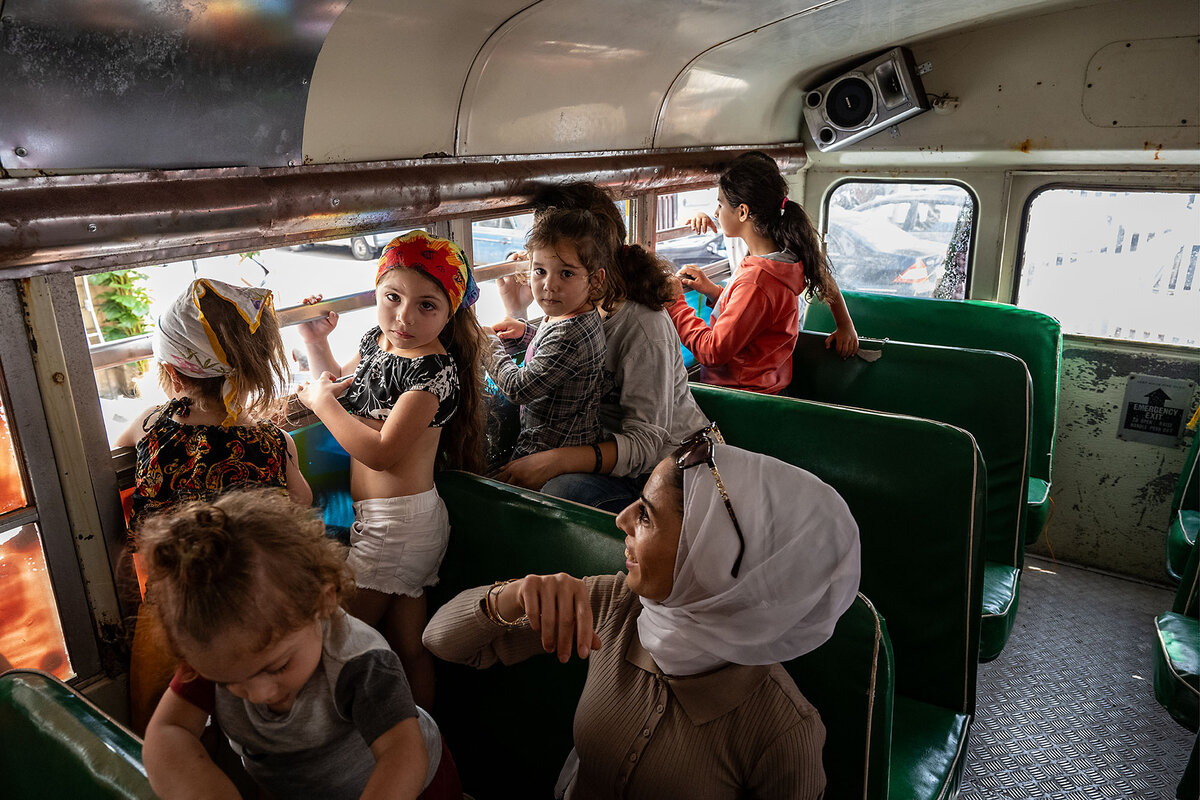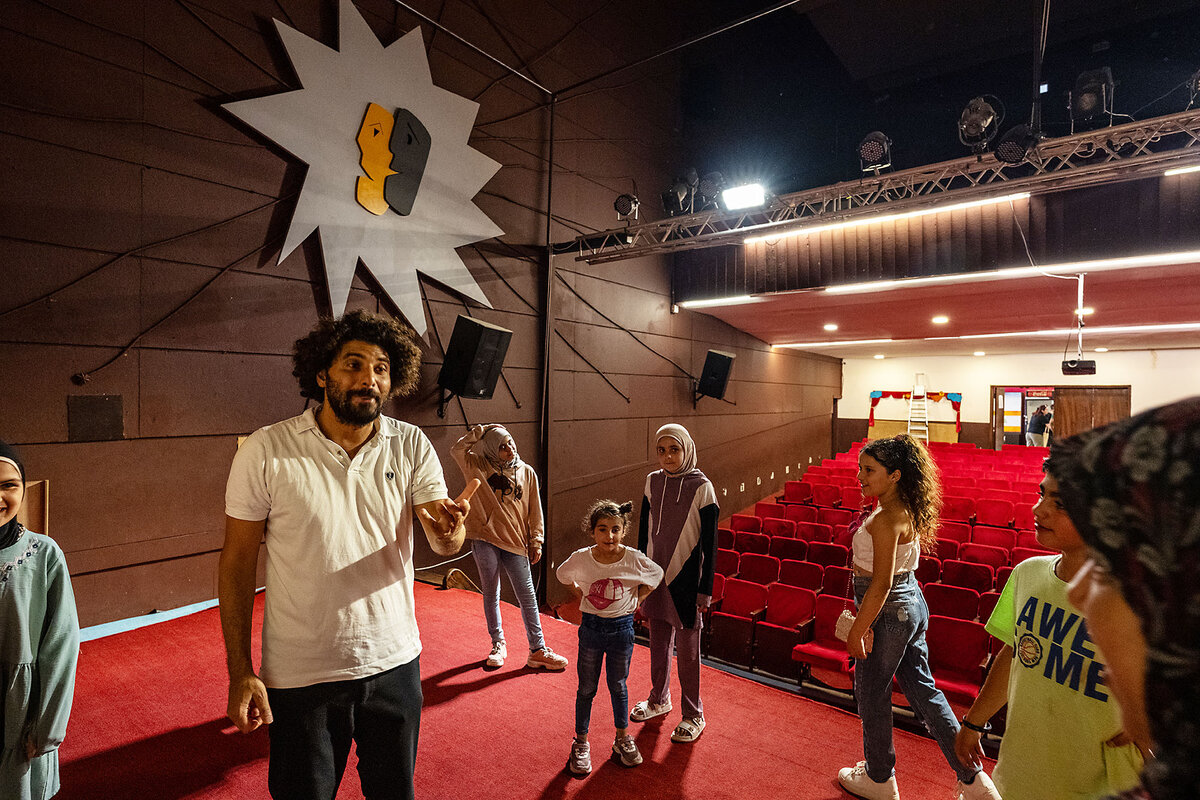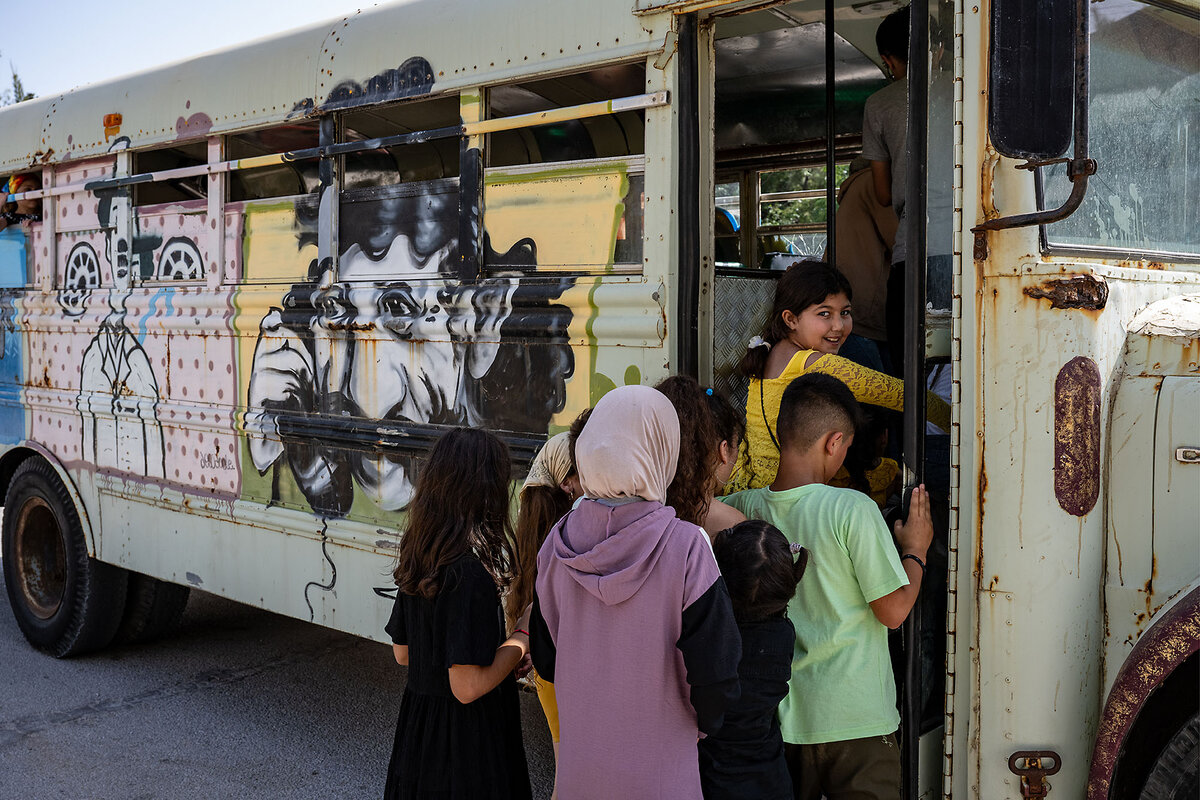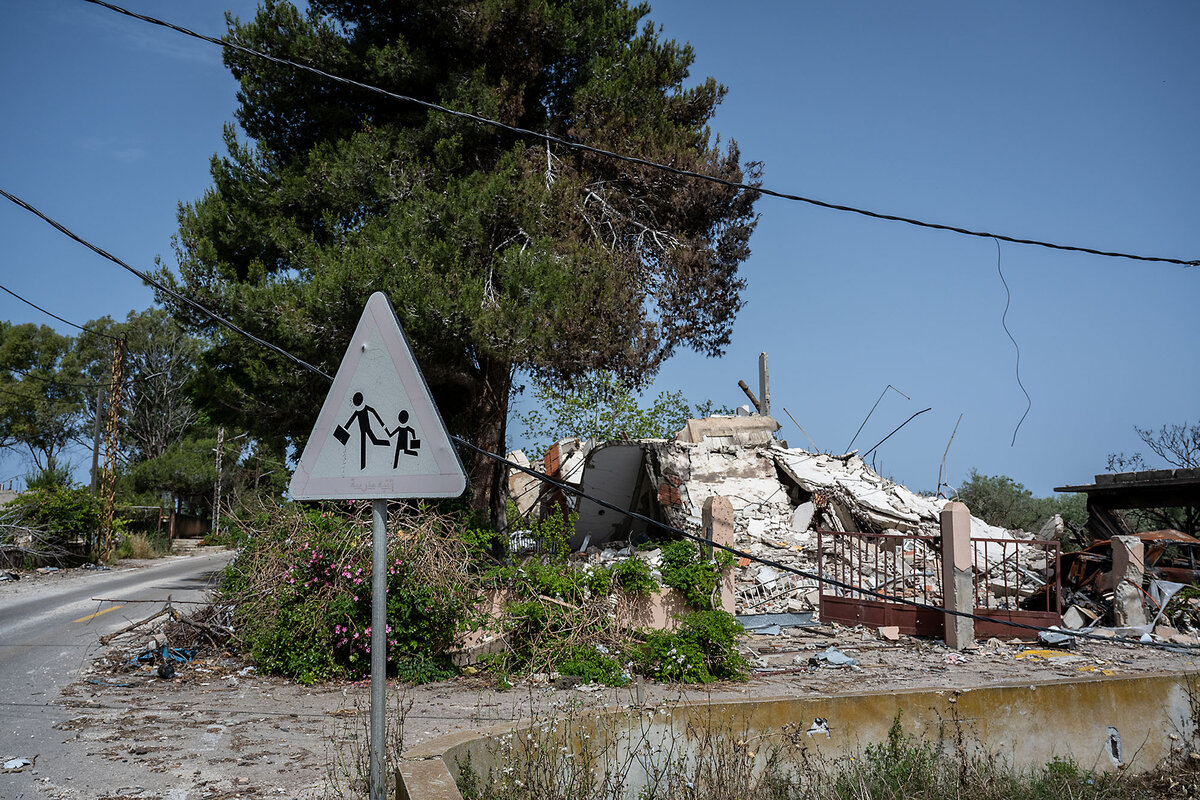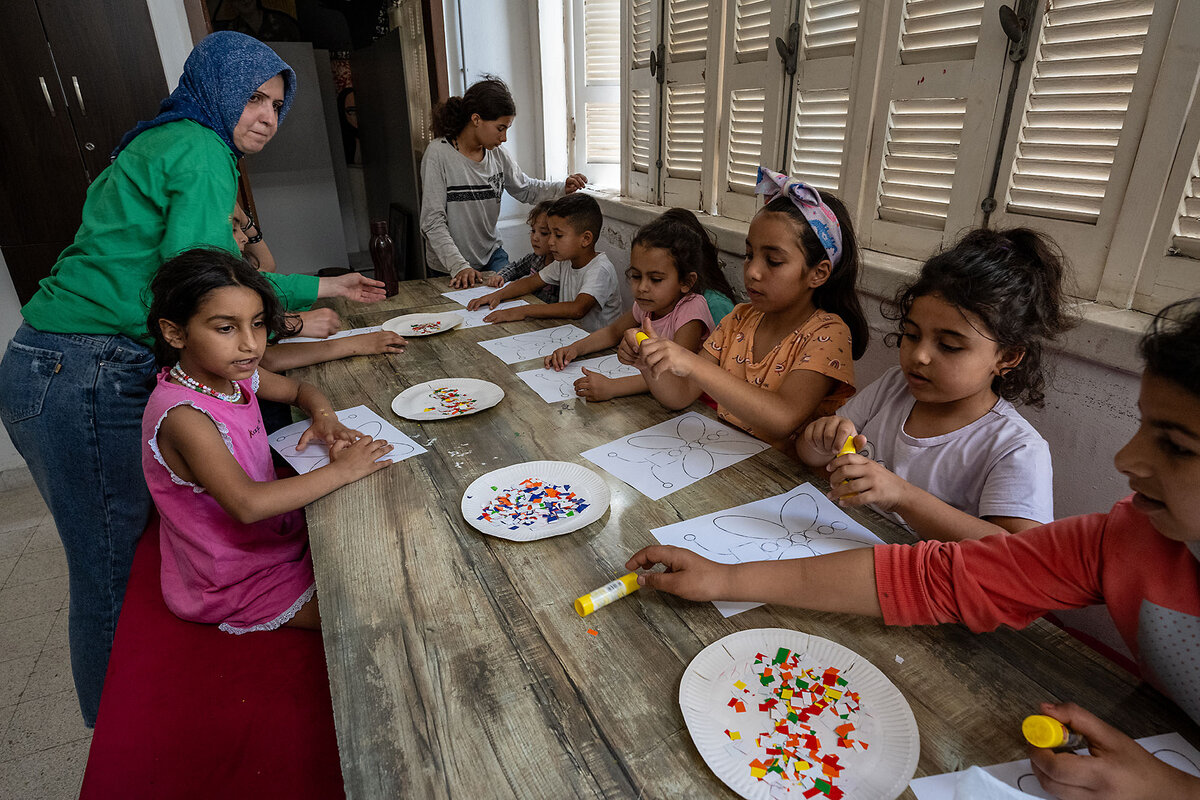How Lebanese escape Hezbollah-Israel fight, a war beyond their control
Loading...
| TYRE, LEBANON
Displaced by war and traumatized by lives turned upside down, the Lebanese schoolchildren jump for joy, scream, and run with abandon when their bus arrives.
It’s a dilapidated American school bus, covered in graffiti, but it’s their ticket to an afternoon of escape.
The children race to be the first on the bus for the ride from their temporary shelter in a school to a theater renovated by the Tiro Association for Arts. There, they will participate in games on the stage and art activities that could not feel farther from south Lebanon’s front lines – which is precisely the point.
Why We Wrote This
A story focused onNonbelligerents in war often pay a very high price in the violent disruption of their lives. In Lebanon, the children, perhaps, can be entertained and distracted in the moment, but adults are all too aware of the value of what has been lost.
As the children sing and dance, with music blaring from the bus speakers, they are clearly grateful for this excuse to leave behind the dangers and tensions of the escalating conflict between the Iran-backed Shiite Hezbollah militia and Israel.
Over the last eight months, the low-level war has displaced some 90,000 Lebanese from the border and left 100 civilians dead.
“Bombing chased us all the way,” says a mother, who gives the name Farah, about her family’s escape to the coastal city of Tyre from their border village of Beit Lif when the fighting erupted last October. Wearing a white headscarf with sunglasses perched on top, she rides the bus with her five children, who are bursting with excitement for the theater fun that they know awaits them.
While these children enjoy a brief respite, their moment of happiness is but one bright point along the wide spectrum of challenging and often debilitating experiences for the tens of thousands of Lebanese caught in this war, which began when Hezbollah launched attacks against Israel in solidarity with the Palestinian Hamas.
The civilians are traumatized – some, they say, to the point of contemplating suicide – by the violent disruption of their lives by events beyond their control, with no end to the conflict in sight.
“Sometimes air strikes happen, and the kids hear it here and start screaming – they developed a phobia from the bombing,” Farah says. “This [arts experience] makes them forget the war, and keeps their minds busy with something else.”
Arriving at the theater, the children clamber off the bus – a brightly painted but rusting school bus built in the United States in 1977. The Tiro Association, which calls it the “Peace Art Bus,” has launched a GoFundMe campaign to pay for an upgrade.
Some children go upstairs to draw and paint in rooms hung with old movie posters and antique metal film reels. Other children pass down the aisles of plush velvet seats in the auditorium and climb onto the stage, where Tiro Association executive director Kassem Istanbouli – with his voluminous hair and irresistible energy – leads a series of acting and role-play exercises under the stage lights.
“Culture is a way of resistance,” says Mr. Istanbouli, who founded the association in 2014 to restore old theaters and turn them into arts centers. “When you open the space during a conflict, it is resistance to be alive, to say, ‘We are here,’ to say, ‘We need to complete life’ – to give joy to the children.”
“They have many dreams,” he says of the 300 children from underprivileged families that the Tiro Association now supports with art and theater.
“What is important now is to take all the pressure out,” says Mr. Istanbouli. “Imagine you lose your house; you are sitting in [shelter] schools all this time. You think you will go back in one week, and then you are eight or nine months in the schools – it’s a difficult life.”
The games in the theater “let them use their voices and their bodies, to feel joy and make them laugh,” he says. “It’s space where we share a human language. We laugh together; we clap together. They dance from the beginning to the end. They have energy. They need to get this energy out.”
Such moments of joy are in short supply for many of the other tens of thousands of Lebanese who fled the border region. The majority now live in safer areas, staying with family members or in rented accommodations, but after eight months of war, resources and goodwill have run thin or been depleted altogether.
When this war began, many expected a scenario similar to that of 2006, when the last major Hezbollah-Israel battle destroyed much of southern Lebanon, but was also over in 33 days.
“At the beginning, the Lebanese people did panic. ... You saw a lot of preemptive displacement; people thought the sky would fall on their heads,” says Maureen Philippon, the Lebanon country director for the Norwegian Refugee Council, which supports the displaced and some of the 60,000 Lebanese estimated to remain within 6 miles of the border.
Lebanon is confronting a national economic slide that has left half its citizens and more than 90% of Syrian and Palestinian refugees living here living below the poverty line, and relief agencies and the United Nations already face cash shortages.
Nongovernmental agencies like the Norwegian Refugee Council planned for worst cases such as the entire south of Lebanon being cut off. Early on, under the assumption that supermarkets would be closed, food parcels containing a two-week dry food ration and household cleaning products were standard for those who remained.
“We are still keeping ready for worst-case scenarios, but because everyone learned to live in that environment [of continuing conflict], cash makes more sense,” says Ms. Philippon, of how assistance is often distributed now.
“We’ve seen an intensification of the fighting, in both ways,” she adds of the Hezbollah-Israel exchanges of recent weeks. Though it’s been quieter the last few days, overall this front has seen “flare-ups, and an increase in violence, that are more intense, more frequent, and last longer in time.”
“The stress on the families who stayed there – and the kids, in a number of families we interviewed – the psychological effect of the bombing, the noise, the fear, is super heavy,” she says.
Indeed, the toll of living away from home for so many months has been high for many. One farmer fled to Beirut with his wife three days after the war began. On the sixth day, his neighbors reported that his house had been destroyed in an Israeli strike.
“I am willing to go back now, put a tent on the rubble of my house, and stay,” says the farmer, whose house of three decades used to be 500 yards from the Israel border. The farmer, who withheld his name for security reasons, says he pines for the fresh air, the tasty crunch of his own produce, and quiet nights.
The eight-month stay squeezed in with his son’s family in Beirut has been so stressful that his wife has been admitted to a hospital for anxiety. Their savings were used up long ago. The farmer now sells vegetables from a street stall to keep busy, but he earns a pittance, and the long hours are not sustainable.
“A lot of us thought it would end quickly, but it keeps escalating every day,” says the farmer, whose face is creased from his eyes to the corners of his mouth. He breaks down in tears, and says he has considered ending his life.
“I can’t take it anymore,” he says, adding that he can’t afford to treat his wife.
“She had a lot of anxiety because of the bombing at the border,” he says. “We have a fear of watching TV, of watching houses being destroyed. When we watch the news, there is no sleep at night.”
Referring to the the belligerents in this war, he adds, “They can go to the mountains far away and fight day and night. ... I just want a house.”






